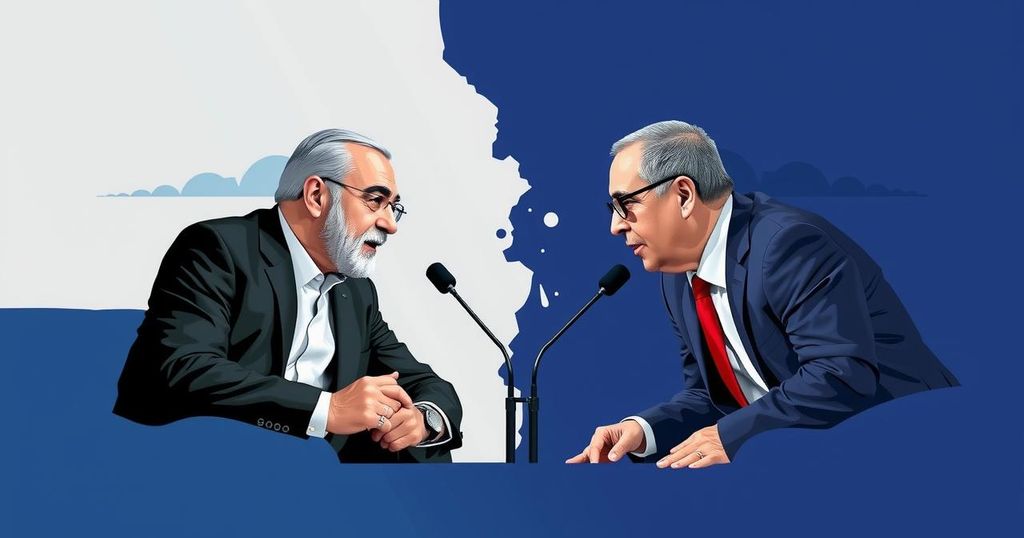President Biden expressed cautious optimism about the possibility of reducing tensions between Israel and Iran, while suggesting that achieving a ceasefire in Gaza is more challenging. His remarks followed a meeting with European leaders in Berlin and come amidst escalating violence and geopolitical complexities in the region.
In recent statements made by United States President Joe Biden, he expressed a cautious optimism regarding the potential for a temporary cessation of hostilities between Israel and Iran, in contrast to his more pessimistic view on achieving a ceasefire in the ongoing conflict in Gaza. During a press conference held in Berlin, where he convened with leaders from Germany, France, and the United Kingdom, President Biden underscored the possibility of negotiating a truce that would alleviate the current tensions between Israel and Iran, remarking that there exists a collective belief among his colleagues to manage the situation that would bring about a halt to the ongoing violence. Biden’s remarks appear to indicate a shift in U.S. policy. Last week, the State Department had indicated a lack of interest in pursuing a ceasefire between the militant group Hezbollah and Israel, alluding to the weakened state of Hezbollah following the assassination of key leaders. The backdrop of increasing hostilities is significant; recent events have seen Iran executing missile strikes against Israel, purportedly in retaliation for the targeted killings of Hamas and Hezbollah leaders. The escalation includes Iranian assaults on Israeli military installations, which were a response to previous attacks, intensifying the precarious balance of power in the region. On issues pertaining to Gaza, Biden downplayed the likelihood of an imminent ceasefire following the recent death of Hamas leader Yahya Sinwar, characterizing it as another hurdle in the pursuit of peace. He commented, “We think that there’s a possibility of working for a ceasefire in Lebanon. And it’s going to be harder in Gaza, but we agree that there has to be an outcome – what happens the day after?” This sentiment reflects the complexities surrounding the Gaza conflict, which has resulted in a catastrophic humanitarian situation, with substantial loss of life and displacement of civilians. Further complicating the situation are the United States’ commitments to Israeli military support. Biden reaffirmed the administration’s resolve to maintain military aid despite escalating concerns about humanitarian atrocities occurring in Gaza. The U.S. has remained a steadfast supporter of Israel’s military actions, despite warnings against exacerbating the conflict. In addition, the evolving situation in Lebanon raises further concerns, particularly with Hezbollah indicating an escalation in its military confrontations with Israel. This ongoing strife could see a broader regional conflict if not addressed timely. The international community remains watchful as Biden’s administration attempts to navigate these multifaceted challenges and the implications for regional stability.
The Middle East has been embroiled in a cycle of conflict, notably between Israel and Iran, which has heightened in intensity with recent military engagements. These hostilities have their roots in longstanding geopolitical tensions involving Iran’s support for militant groups like Hamas and Hezbollah, and Israel’s defensive posture against perceived threats from these entities. The recent flare-ups have been catalyzed by retaliations over assassinations of key figures within these militant organizations, further complicating any negotiations aimed at establishing peace. President Biden’s statements reflect the U.S. government’s approach to mitigating these tensions while balancing its strategic alliances and commitments to Israel.
In summary, President Biden’s remarks encapsulate a delicate balance of hopes for a de-escalation between Israel and Iran while acknowledging the complex and challenging dynamics in Gaza. The President’s indication of a potential for a ceasefire in Lebanon stands in stark contrast to the grim prospects for Gaza, underscoring the multifaceted crises faced in the region. As the U.S. contemplates its strategies, the ramifications on humanitarian conditions and geopolitical stability in the Middle East remain critical considerations. Consequently, the international community awaits further developments as Biden’s administration navigates these turbulent waters.
Original Source: www.aljazeera.com







